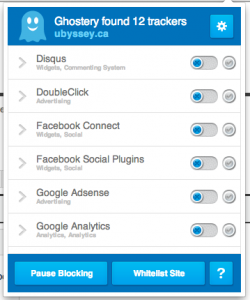Ever feel as though you’re being watched? If you spend a lot of time online, that sentiment may be justified.
 It is no longer a secret that an overwhelming number of online companies now use data mining to target their ads based on individuals’ specific internet histories. Ever looked up an item online, only to notice it advertised in your Facebook sidebar mere minutes later? Companies tracking your online movements are to blame. In an age where privacy is disappearing, your personal data is extremely valuable. Love ice capps, Lionel Messi’s left foot, and cute animal pictures? That information has a monetary value to companies, many of whom have begun tracking users online in an effort to collect as much information as possible.
It is no longer a secret that an overwhelming number of online companies now use data mining to target their ads based on individuals’ specific internet histories. Ever looked up an item online, only to notice it advertised in your Facebook sidebar mere minutes later? Companies tracking your online movements are to blame. In an age where privacy is disappearing, your personal data is extremely valuable. Love ice capps, Lionel Messi’s left foot, and cute animal pictures? That information has a monetary value to companies, many of whom have begun tracking users online in an effort to collect as much information as possible.
Some Internet users argue that they are not necessarily against the practice, stating that they would rather see ads tailored to their interests than ones completely irrelevant to them. However, most people are uncomfortable with the idea of being tracked online by an uncountable number of seemingly omnipresent companies, that are ultimately amassing a gargantuan amount of personal information for their own corporate gain.
How can you monitor these companies tracking your online behavior? Enter Ghostery, an add-on that allows you to detect who is following you – and even stop them in their tracks. The tool allows Internet users a glimpse into “the invisible web” of behavioral data providers, and other companies interested in your online activity. The plug-in adds a small icon to the top of your server, which shows the number of sites tracking you at any given time. Upon clicking the icon, a drop down menu appears listing the sites. It then gives you the option to block the trackers following you.
A bit of experimentation with the add-on allowed for some pretty interesting findings. On ubc.ca, Ghostery recorded 2 trackers. On the Ubyssey, the site for UBC’s student newspaper, that number jumped to 12. Interestingly, on Facebook, there only appear to be 3 trackers, and on LinkedIn, only 1. But read an article on the Washington Post and the number jumps up to 37.
A person’s internet history provides an in-depth look into their life – not only their age, gender and location, but trends about their lifestyle, political views, interactions with friends, and even physical movements. As more and more of our lives shift into the online realm, it becomes increasingly important to remain aware of who we choose to share our personal information with – whether or not the second party is clearly visible, or as obscure as a ghost.

